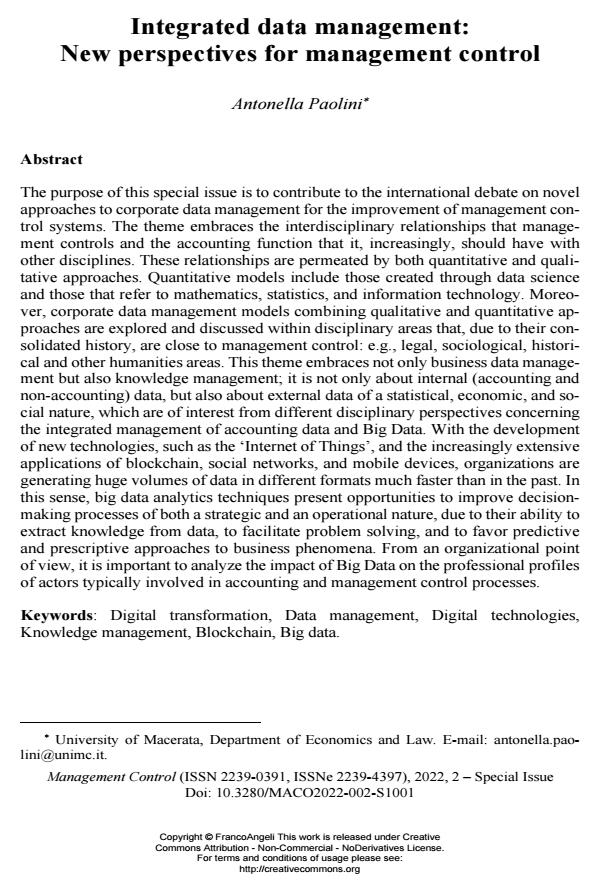Integrated data management: New perspectives for management control
Journal title MANAGEMENT CONTROL
Author/s Antonella Paolini
Publishing Year 2022 Issue 2022/2 Suppl.
Language English Pages 10 P. 5-14 File size 169 KB
DOI 10.3280/MACO2022-002-S1001
DOI is like a bar code for intellectual property: to have more infomation
click here

FrancoAngeli is member of Publishers International Linking Association, Inc (PILA), a not-for-profit association which run the CrossRef service enabling links to and from online scholarly content.
The purpose of this special issue is to contribute to the international debate on novel approaches to corporate data management for the improvement of man-agement control systems. The theme embraces the interdisciplinary relationships that management controls and the accounting function that it, increasingly, should have with other disciplines. These relationships are permeated by both quantitative and qualitative approaches. Quantitative models include those created through data science and those that refer to mathematics, statistics, and information tech-nology. Moreover, corporate data management models combining qualitative and quantitative approaches are explored and discussed within disciplinary areas that, due to their consolidated history, are close to management control: e.g., legal, soci-ological, historical and other humanities areas. This theme embraces not only business data management but also knowledge management; it is not only about internal (accounting and non-accounting) data, but also about external data of a statistical, economic, and social nature, which are of interest from different disci-plinary perspectives concerning the integrated management of accounting data and Big Data. With the development of new technologies, such as the ‘Internet of Things’, and the increasingly extensive applications of blockchain, social net-works, and mobile devices, organizations are generating huge volumes of data in different formats much faster than in the past. In this sense, big data analytics techniques present opportunities to improve decision-making processes of both a strategic and an operational nature, due to their ability to extract knowledge from data, to facilitate problem solving, and to favor predictive and prescriptive ap-proaches to business phenomena. From an organizational point of view, it is im-portant to analyze the impact of Big Data on the professional profiles of actors typically involved in accounting and management control processes.
Keywords: Digital transformation, Data management, Digital technologies, Knowledge management, Blockchain, Big data
- Bellucci M., Nitti C., Chimirri C., Bagnoli L. (2019), Reporting on the social impact. Methodologies, indicators and three cases of experimentation in Tuscany, Management Control, 3, pp. 166-187.
- Cappelli A., Cavallini I. (2021), The Potential of Big Data Analysis in the Shipbuilding Industry: A Way of Increasing Competitiveness. Management Control, 1, pp. 53-74.
- Capurro R., Galeotti M., Garzella S. (2018). Real-traditional world and “digital world”, business strategies and web intelligence: the future of control and information management, Management Control, 2 special issue, pp. 83-111.
- Castellano N., Felden C. (2021), Management Control Systems for Sustainability and Sustainability of Management Control Systems. Management Control, 2, pp. 5-10.
- Cupertino S., Vitale G, Riccaboni A. (2018), The impact of Big Data on corporate planning & control activities. Il caso di studio di una PMI agricola italiana, Management Control, 3, pp. 59-86.
- Dicuonzo G., Dell’Atti V., Fusco A., Donofrio F. (2021), Big data and artificial intelligence for health system sustainability: The case of Veneto Region, Management Control, 1, pp. 31-52.
- Lombardi R., Trequattrini R., Schimperna F., Cano-Rubio M. (2021), The Impact of Smart Technologies on the Management and Strategic Control: A Structured Literature Review, Management Control, special issue (1), pp. 11-30.
- Mancini D. (2018), Evoluzione e prospettive dei sistemi di informazione e di controllo, Management Control, 2, pp. 5-14.
- Marchini P.L., Davoli L., Belli L., Medioli A. (2019), Internet of Things and Industry 4.0: a successful case study of digital manufacturing, Management Control, 3, pp. 11-34.
- Montemari M., Nielsen C. (2021). Big data for business modeling: Towards the next generation of performance measurement systems? Management Control, 1, pp. 5-10.
- I Big Data non "parlano da soli". Il ruolo dei modelli nella diffusione degli analytics per il management accounting Roberto Del Gobbo, in MANAGEMENT CONTROL 1/2023 pp.5
DOI: 10.3280/MACO2023-001001 - The impact of digitalisation on professional football clubs Fabio Nappo, Alessandra Lardo, Maria Teresa Bianchi, Federico Schimperna, in MANAGEMENT CONTROL 2/2023 pp.117
DOI: 10.3280/MACO2023-002006 - Blockchain implications for the accounting realm: A critique of extant studies Rosanna Spanò, Maurizio Massaro, Adele Caldarelli, Carlo Bagnoli, in MANAGEMENT CONTROL 1/2023 pp.21
DOI: 10.3280/MACO2023-001002 - The contribution of information and communication technologies on performance management and measurement in healthcare: a systematic review of the literature Christian Di Falco, Guido Noto, Carmelo Marisca, Gustavo Barresi, in The TQM Journal /2024 pp.371
DOI: 10.1108/TQM-12-2023-0425 - Metaverse: Value creation and performance measurement across physical and digital world Rosita Capurro, Raffaele Fiorentino, Stefano Garzella, Stefano Marciano, in MANAGEMENT CONTROL 1/2024 pp.131
DOI: 10.3280/MACO2024-001007 - Exploring the nexus between corporate digitalisation and environmental sustainability: The moderating role of slack resources Sebastiano Cupertino, Gianluca Vitale, in MANAGEMENT CONTROL 1/2024 pp.87
DOI: 10.3280/MACO2024-001005
Antonella Paolini, Integrated data management: New perspectives for management control in "MANAGEMENT CONTROL" 2 Suppl./2022, pp 5-14, DOI: 10.3280/MACO2022-002-S1001